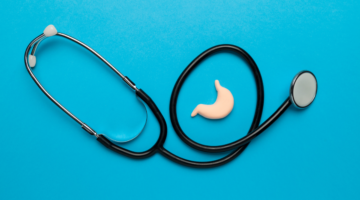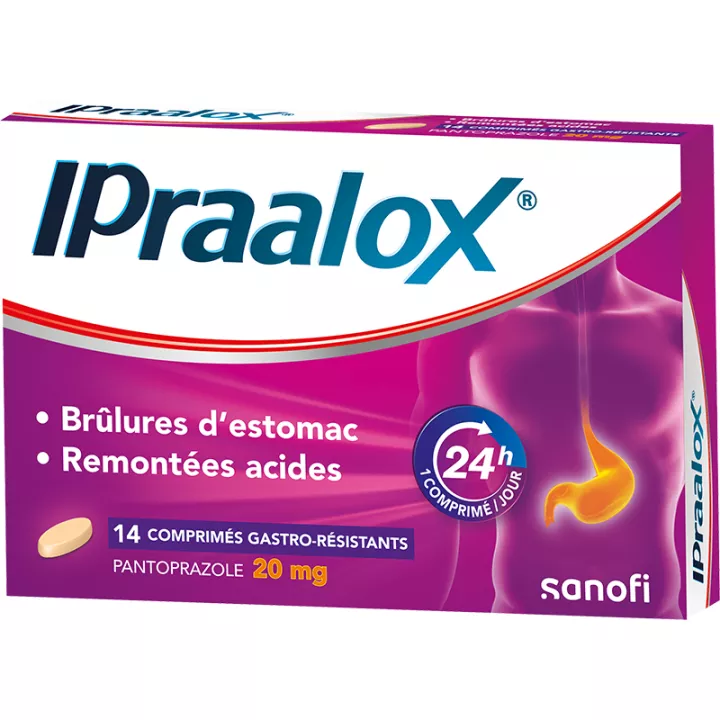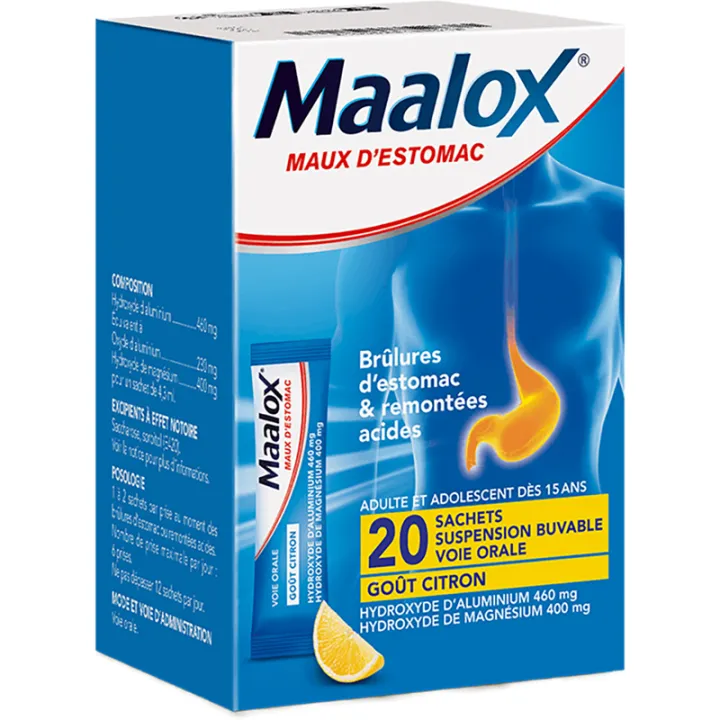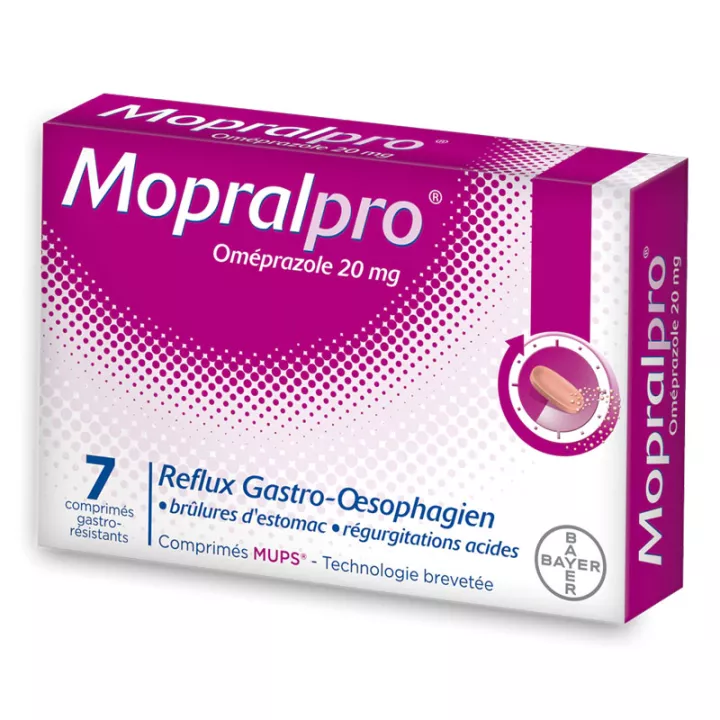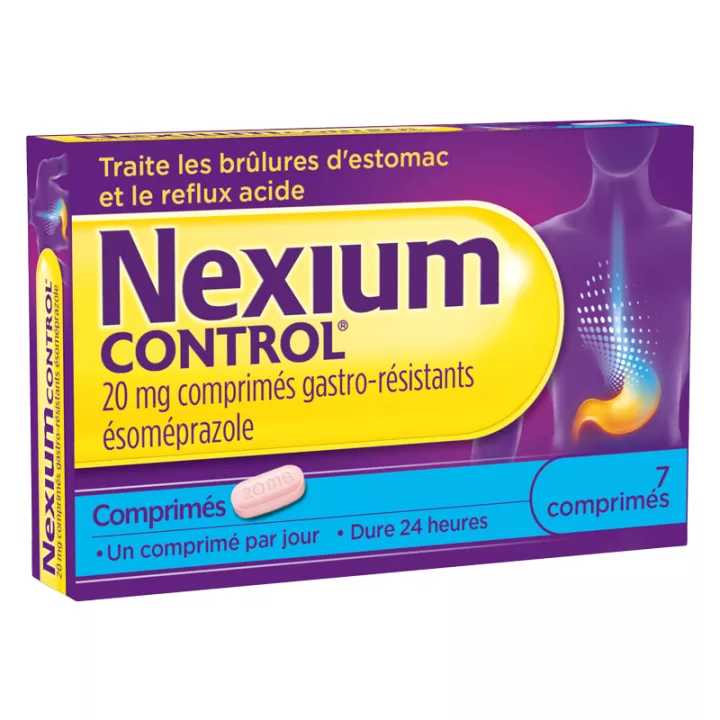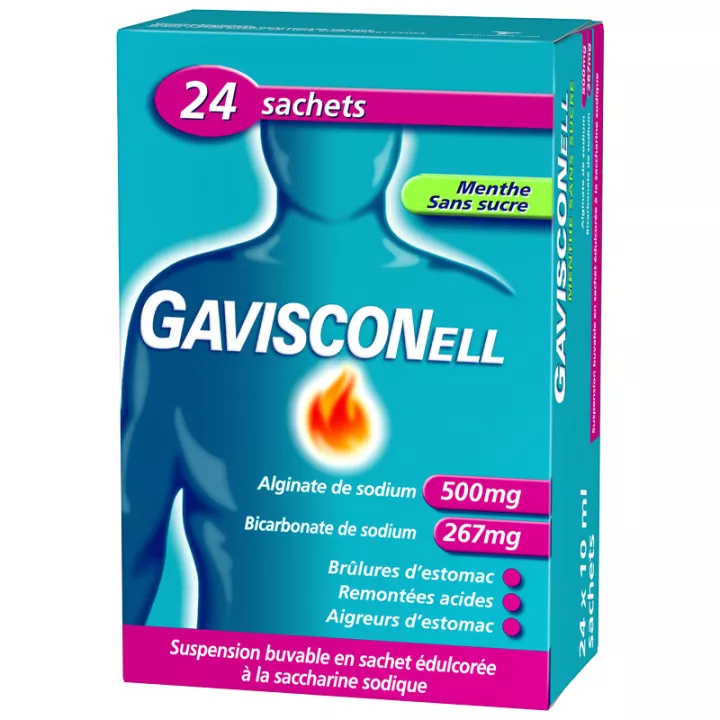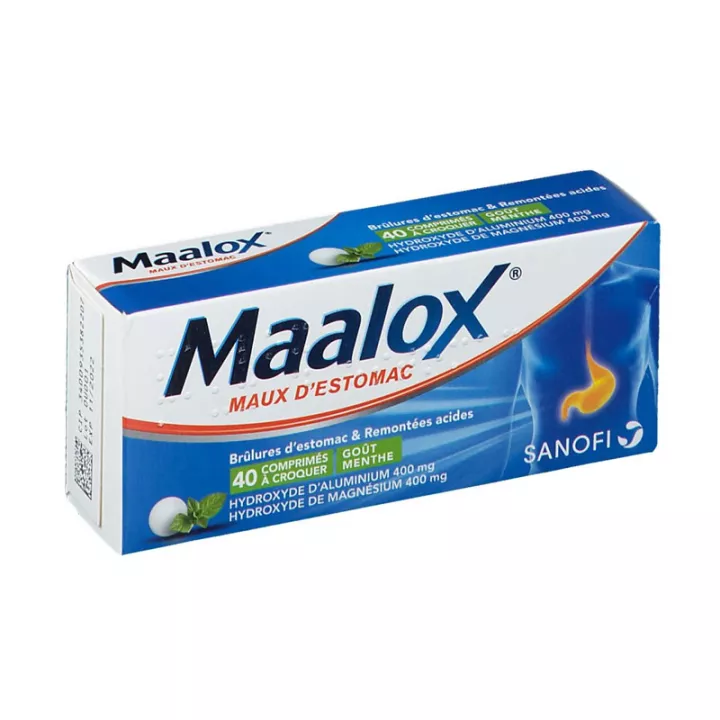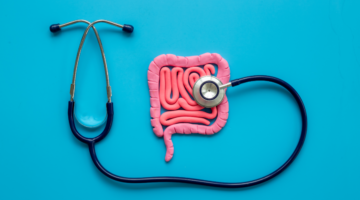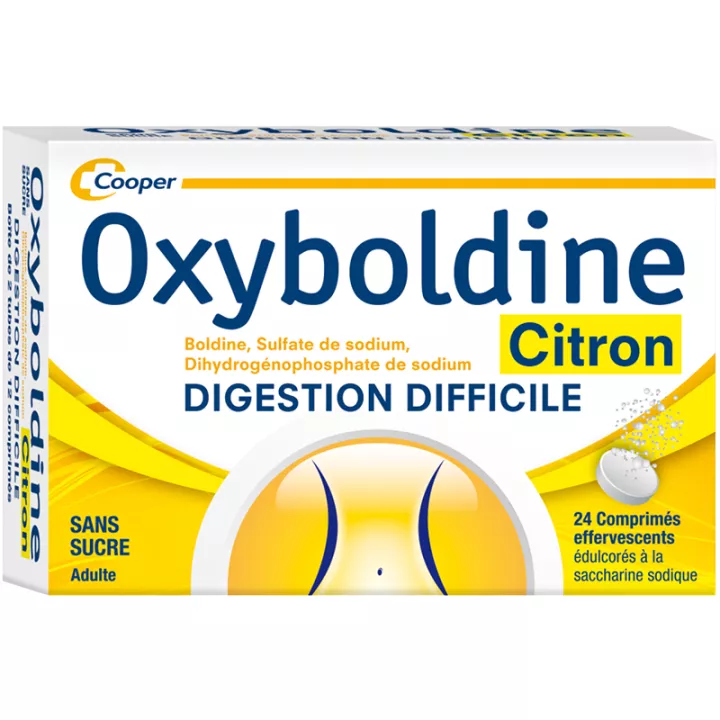NOTICE
ANSM - Last updated: 10/05/2017
Name of the medicinal product
IPRAALOX 20 mg, gastro-resistant tablet
pantoprazole
framed
Please read this leaflet carefully before you start taking this medicine because it contains important information for you.
You should always take this medication exactly as prescribed in this leaflet or by your doctor or pharmacist.
· Keep this leaflet. You might need to read it again.
· Ask your pharmacist for advice or information.
· If you experience any side effects, talk to your doctor or pharmacist. This also applies to any side effects not mentioned in this leaflet. See section 4.
· You should contact your doctor if you experience no improvement or feel less well after 2 weeks.
What is in this leaflet?
1. What is IPRAALOX 20 mg Gastro-Resistant Tablets and in which cases is it used?
2. What should I watch out for before taking IPRAALOX 20 mg gastro-resistant tablets?
3. How to take IPRAALOX 20 mg, Gastro-resistant tablet?
4. What are the possible side effects?
5. How to store IPRAALOX 20 mg Gastro-Resistant Tablets?
6. Package contents and other information.
1. WHAT IS IPRAALOX 20 mg, gastro-resistant tablet AND WHAT IT IS USED FOR?
Pharmacotherapeutic group - Proton pump inhibitors, ATC code: A02BC02.
IPRAALOX contains an active substance, pantoprazole, which reduces the amount of acid produced in the stomach by blocking the "proton pump".
IPRAALOX is used for short-term treatment of symptoms of gastroesophageal reflux (eg heartburn, acid regurgitation) in adults.
Gastroesophageal reflux is the rise of acid from the stomach into the esophagus, which can become inflammatory and painful. This can cause symptoms such as burning in the chest going up to the throat (heartburn) and sour taste in the mouth (acid regurgitation).
Acid reflux and heartburn may disappear after a day of treatment with IPRAALOX. However this medication is not intended to provide immediate relief. It may be necessary to continue treatment for 2 or 3 consecutive days for symptom improvement.
2. BEFORE YOU TAKE IPRAALOX 20 mg Gastro-Resistant Tablets?
Do not take IPRAALOX:
· If you are allergic to pantoprazole, soy lecithin or any other component of this medication (see section 6).
· If you are taking a medication containing atazanavir (for the treatment of HIV infection), see section "Other medicines and IPRAALOX".
Warnings and Precautions
Talk to your doctor or pharmacist before taking IPRAALOX:
· If you have liver problems or jaundice (jaundice, yellowing of the skin or eyes);
· If you have taken continuously a treatment for heartburn or indigestion for 4 weeks or more;
· If you are over 55 and take a daily medication for indigestion delivered without a prescription;
· If you are over 55 years old and have symptoms of gastroesophageal reflux appearing for the first time or having recently changed;
· If you have a history of gastric ulcer or undergone stomach surgery;
· If you regularly visit your doctor because of serious disorder or illness;
· If you need to do an endoscopy or a urea breath test.
· If you have ever developed a skin reaction after treatment with a drug similar to IPRAALOX reducing gastric acid.
· If you need to do a specific blood test (Chromogranin A).
Consult your doctor immediately before or after taking IPRAALOX if you notice any of the following symptoms, which could be a sign of another more serious illness:
· Unintentional weight loss (not related to diet or exercise program),
· Vomiting, particularly if repeated,
· Vomiting blood, appearing under the aspect of dark coffee beans,
· Blood in the stool, which can be black or tarry,
· Difficulty or pain in swallowing,
· Pallor and weakness (anemia),
· Pain in the chest,
· Stomach ache,
· Severe and / or persistent diarrhea, as IPRAALOX has been associated with a slight increase in infectious diarrhea.
Your doctor may decide that you need to undergo additional tests.
If you have a blood test, tell your doctor that you are taking IPRAALOX.
Acid uproar and heartburn may disappear after one day of treatment with IPRAALOX. However this medication is not intended to provide immediate relief. You should not take it as a preventive measure.
If you suffer from heartburn or repeated and persistent indigestion, regular medical follow-up is recommended.
If you develop a rash, especially in areas exposed to the sun, consult your doctor as soon as possible, as you may need to stop your treatment with IPRAALOX. Do not forget to mention any other harmful effects, such as pain in your joints.
Children and Youth
Few safety data are available for this population, IPRAALOX should not be taken by a child or adolescent under 18 years of age.
Other drugs and IPRAALOX 20 mg, gastro-resistant tablet
Inform your doctor or pharmacist if you are taking, have recently taken or may take any other medicines.
IPRAALOX may affect the effectiveness of other medicines. Consult your doctor or pharmacist if you are taking a medication containing any of the following active ingredients:
· Atazanavir (used in the treatment of HIV infection). You should not take IPRAALOX if you are taking Atazanavir. See section "Never take IPRAALOX".
· Ketoconazole (used in the treatment of fungal infections).
· Warfarin and phenprocoumone (used to reduce blood clotting and prevent clots). Additional blood tests may be required.
· Methotrexate (used in the treatment of certain types of cancers, some forms of severe psoriasis and in rheumatoid arthritis) - if you are taking methotrexate, your doctor may temporarily discontinue your treatment with IPRAALOX because pantoprazole may increase methotrexate in the blood.
Do not take IPRAALOX with other drugs that limit the acidity of the stomach, such as another proton pump inhibitor (omeprazole, lansoprazole or rabeprazole) or anti-H2 (eg ranitidine, famotidine ).
You can however take IPRAALOX with an antacid (eg magaldrate, alginic acid, sodium bicarbonate, aluminum hydroxide, magnesium carbonate or combination of these substances) if necessary.
IPRAALOX 20 mg, Gastro-resistant tablet with food, drink and alcohol
Not applicable.
Pregnancy and breast feeding
You should not take this medication if you are pregnant or breast-feeding.
If you are pregnant or breastfeeding, think you may be pregnant or plan a pregnancy, ask your doctor or pharmacist for advice before taking this medicine.
Driving and using machines
If you experience any side effects such as dizziness or blurred vision, you should not drive or use machines.
IPRAALOX contains maltitol and soya lecithin
If your doctor has told you about an intolerance to some sugars, contact your doctor before taking this medicine.
IPRAALOX contains soya lecithin. If you are allergic to peanut or soy, do not take this medicine.
3. HOW TO TAKE IPRAALOX 20 mg gastro-resistant tablet?
Always take this medication exactly as prescribed in this leaflet or as directed by your doctor or pharmacist. In case of doubt, check with your doctor or pharmacist.
Take one tablet per day. Do not exceed this recommended dose of 20 mg pantoprazole per day.
You should take this medication for at least 2 or 3 consecutive days. Stop taking IPRAALOX when you no longer experience any symptoms. Acid uproar and heartburn may disappear after a single day of treatment with IPRAALOX. However this medication is not intended to provide immediate relief.
If your symptoms persist after 2 weeks of continuous treatment, see your doctor. Do not exceed 4 weeks of treatment without medical advice.
Take the tablet before a meal at the same time each day. Swallow the whole tablet with a glass of water. Do not crush or crush the tablet.
If you take more than IPRAALOX 20 mg, Gastro-resistant tablet you should:
Consult your doctor or pharmacist immediately. If possible, show your medication and this leaflet. There are no known symptoms of overdose.
If you forget to take IPRAALOX 20 mg, gastro-resistant tablet:
Do not take a double dose to make up for the missed dose. Take one tablet the next day at the usual time.
If you have any further questions on the use of this medication, ask your doctor or pharmacist.
If you stop taking IPRAALOX 20 mg, gastro-resistant tablet:
Not applicable.
4. WHAT ARE POSSIBLE SIDE EFFECTS?
Like all medicines, IPRAALOX can cause side effects, although not everybody gets them.
Tell your doctor immediately or contact the nearest hospital emergency department if you experience any of the following serious side effects. Stop immediately taking IPRAALOX, but take this leaflet and / or tablets with you.
Serious allergic reactions (rare frequency: may affect up to 1 in 1,000 people): hypersensitivity reactions, called anaphylaxis, anaphylactic shock and angioedema. Typical symptoms are swelling of the face, lips, mouth, tongue and / or throat, which may cause difficulty in breathing or swallowing, hives, severe dizziness with accelerated heartbeat, and abundant perspiration.
Serious skin reactions (indeterminate frequency: the frequency of which can not be estimated from the available data): swelling, skin peeling or blisters, lesions or bleeding around the eyes, nose, mouth or genitals and rapid deterioration of your general condition; rash, potentially accompanied by joint pain or rash as a result of exposure to the sun.
Other serious reactions (indeterminate frequency: effect whose frequency can not be estimated from the available data): yellowing of the skin and eyes (due to severe hepatic involvement) or renal disorders, eg pain on urination and pain at the bottom of the back with fever.
During treatment with the active substance of IPRAALOX, the following adverse effects were observed:
Common side effects (can affect up to 1 in 10 people)
Mild polyps in the stomach.
Uncommon side effects (can affect up to 1 in 100 people)
Headache, dizziness, diarrhea, nausea, feeling sick, vomiting, bloating and flatulence (gas), constipation, dry mouth, stomach pain and abdominal discomfort, rash or urticaria, itching, feeling weak, feeling exhausted or feeling general discomfort, sleep disorders, increased liver enzymes in the blood.
Uncommon side effects (can affect up to 1 in 1000 people)
Disorders of vision, such as blurred vision, joint pain, muscle pain, weight change, increased body temperature, swelling of the extremities, depression, increased bilirubin and fat in the blood (ascertained by a blood test), swelling of the breasts in man, high fever, abrupt decrease in white blood cells (visible in blood tests).
Very rare side effects (can affect up to 1 in 10,000 people)
Disorientation, decreased blood platelets, which may lead to bleeding or bruising, reduced white blood cell count, which can lead to more frequent infections, simultaneous lowering of all blood cells (red blood cells, white blood cells and platelets) (visible in blood tests).
Frequency unknown (effect whose frequency can not be estimated from the available data)
Hallucinations, confusion (especially in patients with a history of these disorders), decreased blood sodium and magnesium levels.
Declaration of side effects
If you experience any side effects, talk to your doctor or pharmacist. This also applies to any side effects not mentioned in this leaflet. You can also report adverse reactions directly via the national reporting system: National Agency for the Safety of Medicines and Health Products (ANSM) and network of Regional Centers of Pharmacovigilance - Website: www.ansm.sante.fr
By reporting adverse reactions, you are helping to provide more information about the safety of the drug.
5. HOW TO STORE IPRAALOX 20 mg gastro-resistant tablet?
Keep this medicine out of the reach and sight of children.
Do not use this medicine after the expiry date which is stated on the carton, label or vial. The expiry date refers to the last day of that month.
For tablets packed in a vial, IPRAALOX must be used within 3 months after the first opening of the vial.
No special storage conditions.
Do not throw any medicines into drains or rubbish. Ask your pharmacist to remove any medications you are no longer using. These measures will help protect the environment.
6. PACKAGE CONTENTS AND OTHER INFORMATION
What IPRAALOX 20 mg contains, gastro-resistant tablets
· The active substance is pantoprazole.
Each tablet contains 20 mg of pantoprazole (as pantoprazole sodium sesquihydrate).
· The other components are:
Core : maltitol (E 965), crospovidone type B, carmellose sodium, anhydrous sodium carbonate, calcium stearate .
Coating: polyvinyl alcohol, talc, titanium dioxide (E171), macrogol 3350, soy lecithin, yellow iron oxide (E172), anhydrous sodium carbonate, methacrylic acid / ethyl acrylate copolymer ) containing polysorbate 80 and sodium laurysulfate, triethyl citrate.
What is IPRAALOX 20 mg Gastro-resistant tablet and contents of the pack
This medication is in the form of yellow ovarian gastro-resistant tablets approx. 8.2 x 4.4 mm.
7 or 14 gastro-resistant tablets (OPA / Aluminum / PVC-Aluminum)
7 or 14 gastro-resistant tablets in a vial (HDPE).
Marketing Authorization Holder
SANOFI-AVENTIS FRANCE
82 AVENUE RASPAIL
94250 GENTILLY
Marketing Authorization Operator
SANOFI-AVENTIS FRANCE
82 AVENUE RASPAIL
94250 GENTILLY
Maker
SOFARIMEX - INDUSTRIA QUIMICA E FARMACEUTICA, SA
AV. DAS INDUSTRIAS - COLARIDE ALTO, AGUALVA
2735-213 CACEM
PORTUGAL
Or
ADVANCE PHARMA GMBH
WALLENRODER STRASSE 12-14,
13435 BERLIN
GERMANY
Or
SANOFI-AVENTIS SP. ZOO
UL. LUBELSKA 52,
35-233 RZESZOW,
POLAND
Names of the medicinal product in the Member States of the European Economic Area
Belgium: Maalox Control 20 mg gastro-resistant tablets
Estonia: Ipraalox
France: Ipraalox 20 mg gastro-resistant tablet
Greece: Ipraalox 20 mg Γαστροανθεκτικό δισκίο
Italy: Maalox Reflusso 20 mg compress gastroresistenti
Lithuania: Ipraalox 20 mg skrandyje neirios tabletės
Latvia: Ipraalox 20 mg zarnās šķīstošās tabletes
Netherlands: Ipraalox, 20 mg maagsapresistente tabletten
Portugal: Stomafor
Romania: Dicarbocalm Control 20 mg gastroenteritis comprimate
Slovenia: Ipraalox 20 mg gastroreztistne tablete
Slovak Republic: Ipraalox 20 mg gastrorezistentné tablety
The last date on which this leaflet was revised is:
To be completed later by the holder
Other
Detailed information on this medicine is available on the ANSM website (France).
Health education councils:
The following lifestyle and diet recommendations may also help relieve heartburn or other symptoms due to acid ascents.
· Avoid heavy meals.
· Eat slowly.
· Stop smoking.
· Reduce the consumption of alcohol or caffeine.
· Lose weight (in case of overweight).
· Avoid tight clothing or a loose belt.
· Avoid eating less than 3 hours before bedtime.
· Raise the head of the bed (in case of nocturnal disturbances).
· Reduce the consumption of foods that cause heartburn, including chocolate, peppermint, spearmint, greasy and fried foods, acid foods, spicy foods, citrus fruits and juices, tomatoes.
